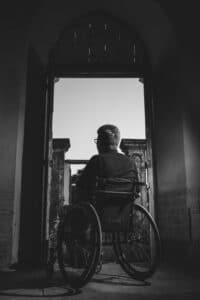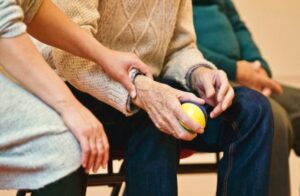Elder abuse in Canada is a far too common problem that robs seniors and vulnerable individuals of their dignity, security, and in some cases, their lives.
Every dependant senior deserves to live in a secure and supportive environment where they are protected, comfortable, and safe from harm. Yet according to the federally incorporated nonprofit corporation CARP, 1 in 6 older individuals are victims of elder abuse in Canada in some varying or blended form. Couple this with estimates indicating a steady increase of the 65+ Canadian population peaking between 2046 and 2065, the risk of elder abuse cases following similar trends is a scary and predicting probability.
Today, elder abuse in Canada is one of the most underreported crimes and has reached epidemic proportions – affecting hundreds of thousands of older individuals yearly. But as detrimental as this reality is to the health and wellbeing of vulnerable populations, it does not mean that ‘what is’ is destined to evolve into a ‘what will be.’ This is because through shared value visions, everyone can do their part to end this toxic form of abuse to keep the ageing community safe. And securing those better tomorrows begins with raising elder abuse awareness, accentuating elder abuse education, and knowing the facts.
The 7 Types of Elder Abuse
According to Statistics Canada, acquaintances of seniors accounted for more than 1 in 4 elder abuse cases, while strangers rendered a quarter of them. In addition, ageing people with physical or mental disabilities are at much higher risk of abuse than those without.
When someone with power over an elderly, disabled, or vulnerable person intentionally harms them or puts them at risk of experiencing harm, their actions or lack of action are considered elder abuse. Keep in mind that elder abuse does not just describe physical injuries, as it can take many forms that can all lead to devastating physical, emotional, and life-threatening consequences.
That said, knowing the types of elder abuse and their red flags is a fundamental step in boosting elder abuse education and preventing elder abuse from recycling. To date, The National Centre on Elder Abuse has broken these into 7 different types.
1. Neglect
Neglect of an older adult is a serious form of abuse that can lead to physical and psychological harm. Neglect occurs when an individual fails to provide the necessary care or otherwise meet their obligations and duties towards an elderly person in their care. This negligence can manifest in various ways, such as failing to provide food, water, clothing, shelter, personal hygiene needs, medical care or safety. Additionally, if a person has fiduciary responsibilities towards an elderly person, but does not fulfil them, such as paying for home care services, this can also be considered neglectful behaviour.
The signs and symptoms of neglect may include dehydration and untreated bed sores, poor personal hygiene, unattended or untreated health issues, sudden weight loss, and medication either not being taken or taken incorrectly. The consequences of neglect on elderly persons can range from physical illness and injury to psychological distress due to the intense feelings of isolation and abandonment.
2. Physical Abuse
Physical elder abuse is a serious problem. It is the deliberate use of physical force to cause bodily harm, physical pain, or impairment. Examples include hitting, slapping, kicking, pushing, shaking, burning, and even inappropriate use of drugs and physical restraints. All of these acts can have long-term detrimental effects on the victim’s wellbeing and mental health. It’s quintessential to note that not all cases of physical abuse will leave visible signs or symptoms. In addition, victims often struggle with guilt or shame after being abused, which can obstruct reporting.
3. Sexual Abuse
Sexual elder abuse is a form of exploitation and mistreatment that is unconscionable and abhorrent. It encompasses all forms of non-consensual sexual contact, from unwanted touching to rape with elderly persons who are incapable or willing to consent. Unfortunately, this type of abuse does happen at home and in care facilities, such as nursing homes and assisted living residences. While some seniors may be too afraid or embarrassed to report the abuse they have experienced, it is important to recognise the signs (mental distraught, bruising, genital infections, etc.) so they can be given help immediately.
4. Abandonment
Abandonment is a critical aspect of elder abuse awareness and elder abuse education. This occurs when someone who has taken on responsibility for delivering care for an elder or vulnerable person deserts them. Abandonment has drastic consequences for the individual involved, as it often leaves them without necessary care and support, leading to things like depression, anxiety, withdrawal from activities, and feeling betrayed by family members/caretakers that previously provided them emotional support.
In conjunction with the emotional impacts abandonment can have on seniors, it also poses significant physical risks, like malnutrition if meals are not provided on time, dehydration if fluids are not readily available, falls due to no one around to help with mobility issues, and increased risk of skin breakdowns due to lack of proper hygiene.
5. Emotional Or Psychological Abuse
Emotional or psychological abuse is a reminder that it is a form of mistreatment and harm that disproportionately affects elderly people. This type of elder abuse is characterised by the infliction of pain, anguish and distress through verbal or nonverbal acts, ranging from verbal assaults, insults, threats, intimidation, humiliation, and harassment. It can also manifest itself in more subtle ways, like treating an older person like an infant, giving them the silent treatment, and enforcing social isolation.
Elderly victims of this kind of abuse may display signs of emotional agitation, extreme withdrawal, abnormal behaviour attributed to dementia (i.e. sucking, biting, rocking), an excessive fear of caregivers, paranoid behaviour towards family members, difficulty sleeping, and become unusually compliant to avoid upsetting a caregiver.
6. Self-Neglect
Self-neglect is an alarming and often overlooked problem among elders. It refers to the neglect of oneself, typically demonstrated by refusing or failing to provide adequate nutrition, water, clothing, shelter, personal hygiene, medication (when indicated), and safety precautions. Elderly individuals may be reluctant to seek assistance due to embarrassment or other reasons, making it especially difficult for family members or friends to recognise and address signs of self-neglect. Although mentally competent older people can exercise their right to make conscious and voluntary decisions about their behaviour, the consequences should still be considered by concerned parties. Failure to do so can lead to physical risks and psychological trauma in extreme cases.
7. Financial Exploitation
Financial or material exploitation of elderly people is a serious issue that can take many forms. Examples include unauthorised cashing of cheques, forging signatures, stealing or misusing money/possessions, deceiving an elder into signing contracts, and the improper use of guardianship or power of attorney. In some cases, unscrupulous individuals may try to manipulate seniors by convincing them to sign documents they don’t fully understand – something that can have devastating financial consequences.
Financial exploitation is especially common among those who are vulnerable due to age-related issues, such as cognitive decline, physical impairments, sensory impairments, and social isolation. Furthermore, family members and close friends may also be perpetrators of such misconduct by taking advantage of their relationship with the elderly person for financial gain. The effects of financial exploitation on elders can be devastating; not only does it strip them of their savings, but it can also lead to depression and anxiety due to the violations.
Financial abuse is the most common, coming in at 62.5% of all elder abuse cases in Canada. Verbal and physical abuse comes second with 35% and 12.5%, respectively, followed by neglect at 10%. [Ontario Human Rights Commission]
Elder Abuse In Canada – The Numbers May Be Higher

Approximately 60,000 of the 1.5M older persons in Ontario alone experience elder abuse. However, many elder abuse victims never speak up about their experience or are willing to report elder abuse because of social stigmas and concerns regarding the consequences of reporting a loved one. As a result, the already high percentage of elder abuse in Canada may be underestimated.
According to CARP, only about 20% of all elder abuse in Canada has come to the attention of someone who is able to help them. Again, this is often tied with self-blame, denial, shame or embarrassment, a fear of losing their home, and caretaker loyalty/dependency. For dependant elders, it poses a hefty dilemma to report, especially if it is a family member abusing them. This is because it’s undeniably hard to highlight elder abuse awareness when love for a person conflicts with their own needs and safety. More dwelling, they may fear the retribution they may receive, which can be in the form of poorer care or harsher abuse.
In general, fear, shame, and denial are all core pillars of why many cases of elder abuse in Canada go unreported. This is why the Council on Ageing advocates that preventing elder abuse is to treat it like domestic violence, requiring systemic approaches to ensure that elder abuse victims are safe to report and will not face further victimisation when seeking to defend their human rights.
Why Elder Abuse Happens
There is no single and simple answer as to why elder abuse occurs. Overall, many factors seem to contribute to abuse, and each unique case has its distinguished merge of them.
- Abusive Style Of Interaction
In some families, the members relate to one another using hostility and a lack of nurturing – leading to generational cycles of abuse. These dynamics can lead to a family culture where children may not experience love or tenderness, but aggression and tension between family members. To break this cycle and prevent elder abuse from being a prime target for family aggression scapegoating, adults must recognise their aggressive behaviours and take steps towards obtaining help through counselling or therapy.
- Dependency
Elderly people may become dependant on their family members for assistance in various ways, such as needing help with housekeeping, running errands, managing finances, and more. This dependence can be a difficult situation for everyone involved, as it can strain the resources of the caregiving family member(s) and create a situation in which abuse may occur.
Conversely, abusers may also be in a dependant position on those they are abusing. This is especially true when an adult child relies on an elderly parent for shelter or money. In such cases of dependency, there are often feelings of guilt or obligation that may lead to long-lasting psychological repercussions. Due to this, it’s important to recognise the power dynamics created by dependant relationships, so that both parties can maintain autonomy and respect for one another.
- Stress
It is no surprise that high levels of stress can lead to abuse in a caregiver situation. When demands exceed available resources, it can be difficult to handle the added pressure and eventually contribute to an abusive environment. However, there are numerous resources available for those struggling with the effects of too much stress in their role as caregivers. These resources could include professional counselling, support groups and hotlines, respite services and programmes, and forms of self-care like getting enough sleep and eating healthy foods.
- Addictions (Alcohol/Drugs/Gambling)
Addiction can have a severe, detrimental impact on individuals and those around them. Studies of elder abuse cases from agencies throughout Canada found that alcohol was a factor in 14.6% of the case files, and in 18.7% of the client records, alcohol was shown to be secondary to abusive behaviour. Similarly, problem gambling can also lead to financial strain for seniors and their families.
In some instances, the seniors themselves may be gambling away necessary funds, while in other cases, a family member could illegally access funds to feed their addiction. Moreover and beyond the financial repercussions, these addictions can have far-reaching psychological effects such as anxiety and depression, as well as physical health issues like an increased risk of developing illnesses or even death due to substance abuse.
- Ageism / Lack of Knowledge
Ageism is known as prejudice and discrimination against older adults, often based on ignorance or misunderstanding of the ageing process. This can involve intentional abuse or neglect, such as in cases where elderly people are assumed to have no value or purpose and are denied necessary support due to their increasing dependence in old age. Ageism can take many forms, including stereotyping and social exclusion, verbal abuse, harassment, physical or emotional abuse, financial exploitation, etc. It can also manifest itself subtly, like assuming an elderly person’s capabilities without considering their actual abilities or ignoring their contributions to society.
- Abuse in Institutional Settings

Elder Abuse Education
In Canada, nearly 10% of women and 5% of men over the age of 65 are living in long-term care facilities like personal care homes, nursing homes, and complex care facilities. Institutional, systemic abuse is sadly a common problem in these settings, which refers to system-wide practises that produce neglect, substandard care, overcrowding, and the violation of dignity. Besides physical, emotional, and neglect, this can also involve mail censorship and lack of privacy.
While physically and cognitively impaired individuals appear more vulnerable to abuse, any dependant person in institutional settings can be subjected to abuse hidden from public scrutiny. Often, this stems from failed management, staff burnout, senior and disability stigmas, and poor enforcement of necessary standards for residential care facilities.
See Something, Say Something
In summary, elder abuse in Canada, and throughout the world for that matter, is intolerable and unacceptable. It is a longstanding issue that has hindered the lives of elder dependants for decades, and has only thickened as the ageing population has grown. But amid the adversity, the good news is that elder abuse awareness, resources, and elder abuse education are more accessible than ever before – ultimately making it easier for the community as a whole to secure positive trajectories forward through the bridging of compassion, care rectification, reporting without repercussion or shame, and holding abuser accountability.
If you see something, say something. If you are being abused, do not hesitate to reach out to the many resources available, and take pride in knowing your advocacy and interventions will motivate others to do the same. If you are a proclaimed abuser, remove yourself from the situation and seek professional assistance to ensure the safety of everyone involved. In the end, everyone has a part to play, and eliminating this reign of abuse begins with knowing where the situation has been, where it stands today, and coming together to create the sustainable change that society needs to see.
Elder Abuse/Neglect Services
Tel: 211 (no area code)
∴
Advocacy Centre for the Elderly
Tel: 416-598-2656 | advocacycentreelderly.org
∴
Seniors Safety Line
Tel: 1-866-299-1011
∴
If you’re in immediate danger, dial 911 or your local police.
If you or an ageing loved one are considering In-Home Care in Etobicoke, Ontario, please contact the caring staff at DaNurse At Your Care Services today. Call (416) 231-6900
A trusted medical and non-medical senior home care provider in Top Skilled Nursing Care at Home in the GTA Toronto, Etobicoke, Oakville, Mississauga, Halton Hills, Vaughn, Niagara Falls, Burlington, Niagara-On-The-Lake, Hamilton, & Scarborough area.
Resources
https://www150.statcan.gc.ca/n1/pub/85-002-x/2022001/article/00011-eng.htm
https://ncea.acl.gov/Suspect-Abuse/Abuse-Types.aspx
https://www12.statcan.gc.ca/census-recensement/2021/as-sa/98-200-X/2021004/98-200-x2021004-eng.cfm
https://www.alberta.ca/get-help-elder-abuse.aspx
https://www.edmontonpolice.ca/CommunityPolicing/FamilyProtection/ElderAbuse/WhyElderAbuseHappens
https://www.nursinghomeabusecenter.com/elder-abuse/causes/
https://nij.ojp.gov/topics/articles/causes-and-characteristics-elder-abuse
https://www.who.int/news-room/fact-sheets/detail/abuse-of-older-people
https://eapon.ca/elder-abuse/what-is-elder-abuse/
https://www.ncoa.org/article/get-the-facts-on-elder-abuse
https://www150.statcan.gc.ca/n1/pub/85-002-x/2021001/article/00001/04-eng.htm
https://academic.oup.com/innovateage/article/1/suppl_1/106/3901648
https://www.nursinghomeabuse.org/elder-abuse/types/
https://www.bcli.org/sites/default/files/Practical_Guide_English_Rev_JULY_2011_0.pdf
https://journals.sagepub.com/doi/full/10.1177/21582440211053256
http://www.agingincanada.ca/Alcohol%20and%20Senior%20Abuse%20Cases.pdf
https://tarrant.tx.networkofcare.org/dv/library/article.aspx?id=1053
https://www.nursinghomelawcenter.org/elderly-abuse-causes.html
https://www.canada.ca/en/employment-social-development/corporate/seniors/forum/financial-abuse.html
https://www.nursinghomeabuse.org/elder-abuse/types/
I’m passionate about delivering professional and affordable in home care services because I’ve seen first-hand the way they can transform lives. When people undergo essential health care treatments in the comfort of their own homes, they’re less anxious and more relaxed—which delivers better outcomes.
We can serve you in the comfort of your own home. The work my team and I do gives people comfort and improves their quality of life. For me, that makes everything worthwhile.
That’s why I formed DaNurse—a health care services company that provides compassionate care to people in the comfort of their own homes. We aim to provide a range of medical services that help people suffering from a range of conditions to live with dignity.
I have worked in the health care system for most of my life—that’s more than three decades. I’m an experienced medical lab technician, but my real professional passion lies in health care. I worked for several years as an ICU nurse, and later as an SRN II.
Away from my career, I’m a natural entrepreneur and a Rotarian. But I suppose my proudest achievement is being a loving mother. Caring for people has always been in my nature, which is why I’m so good at it.
If I or any of the fantastic in home care nurses and medical professionals at DaNurse can help to make your life easier and more comfortable, we’d love to talk to you. Contact us today for an informal chat about your in-home care needs.
- Skilled Nursing Helps Seniors With ALS Live At Home - March 23, 2023
- DaNurse At Your Care Services Attends Community Event for Seniors - March 20, 2023
- 24-Hour Home Care Can Keep Your Senior Sleepwalker Safe - March 15, 2023

